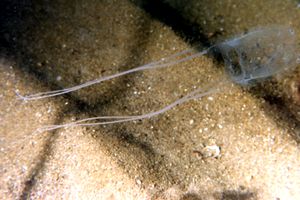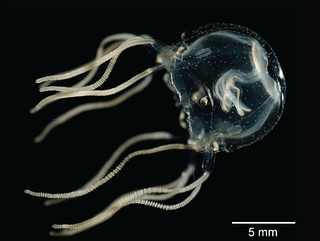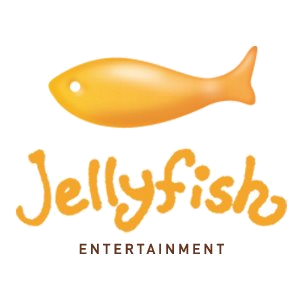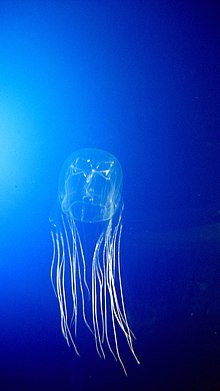
Jellyfish and sea jellies are the informal common names given to the medusa-phase of certain gelatinous members of the subphylum Medusozoa, a major part of the phylum Cnidaria. Jellyfish are mainly free-swimming marine animals with umbrella-shaped bells and trailing tentacles, although a few are anchored to the seabed by stalks rather than being mobile. The bell can pulsate to provide propulsion for highly efficient locomotion. The tentacles are armed with stinging cells and may be used to capture prey and defend against predators. Jellyfish have a complex life cycle; the medusa is normally the sexual phase, which produces planula larva that disperse widely and enter a sedentary polyp phase before reaching sexual maturity.
An antidote is a substance that can counteract a form of poisoning. The term ultimately derives from the Greek term φάρμακον ἀντίδοτον (pharmakon) antidoton, "(medicine) given as a remedy". Antidotes for anticoagulants are sometimes referred to as reversal agents.

Box jellyfish are cnidarian invertebrates distinguished by their box-like body. Some species of box jellyfish produce potent venom delivered by contact with their tentacles. Stings from some species, including Chironex fleckeri, Carukia barnesi, Malo kingi, and a few others, are extremely painful and often fatal to humans.

Chironex fleckeri, commonly known as the Australian box jelly, and nicknamed the sea wasp, is a species of extremely venomous box jellyfish found in coastal waters from northern Australia and New Guinea to Malaysia, the Philippines and Vietnam. It has been described as "the most lethal jellyfish in the world", with at least 64 known deaths in Australia from 1884 to 2021.

Chironex is a genus of box jellyfish in the family Chirodropidae. Their stings are highly venomous, and have caused human fatalities. Based on present knowledge, the genus is restricted to the central Indo-Pacific, ranging from southern Japan to northern Australia.

Carybdea is a genus of venomous box jellyfish within the family Carybdeidae that currently consists of a total of 8 species. This genus of jellyfish are often found in warm waters around the world in waters such as the Mediterranean Sea, the Pacific Ocean, and off the coast of Africa. Their sting can cause a range of effects depending on the species. These invertebrates will go through both sexual and asexual reproduction as they transform from a polyp to medusa. Carybdea have a box-shaped bell with four tentacles and eye-like sensory structures. There are distinct physical markings that differentiate many species within the genus. While Carybdea use their venom to act as predators, they are also preyed on by turtles and various fish. They feed on plankton, invertebrates, fish, and some crustaceans.

Chirodropidae is a family of venomous box jellyfish within the class Cubozoa.

Alatina alata(Reynaud, 1830), often called a sea wasp, is a species of box jellyfish found in the Pacific, Indian and Atlantic Oceans and in the Caribbean and Arabian Sea.

Carukia barnesi is an extremely venomous jellyfish found near Australia. Stings can result in Irukandji syndrome, and this species is commonly known as Irukandji jellyfish, although this name does not distinguish it from other Irukandji jellyfish such as Malo kingi.

Carybdeida is an order of box jellyfish. There are five families within the order. They are distinguished from other box jellyfish by the presence of unbranched muscular bases at the corners of the cubic umbrella. Most species have four tentacles.

"Superfast Jellyfish" is the second single released from British alternative band Gorillaz' third studio album, Plastic Beach. The single was released on 9 May 2010.

Chiropsalmus quadrumanus, commonly known as the four-handed box jellyfish, is a species of box jellyfish found in the western Atlantic Ocean, the Gulf of Mexico and the Pacific Ocean. The sting is venomous and dangerous to humans, especially children.

Carybdea branchi, the South African box jellyfish, is a venomous species of cnidarian, in the small family Carybdeidae within the class Cubozoa.

Tripedalia cystophora is a small species of box jellyfish in the family Tripedaliidae. It is native to the Caribbean Sea and the Central Indo-Pacific.

Carybdea marsupialis, is a venomous species of cnidarian, in the small family Carybdeidae within the class Cubozoa.

Jellyfish Entertainment, is a South Korean entertainment company established by composer and producer Hwang Se-jun in Seoul, South Korea.

Chironex yamaguchii, commonly known as habu-kurage in Japanese and as "hub jellyfish" due to erroneous machine translations, is a species of box jellyfish found in coastal waters around Japan, on Okinawa and the Ryukyu Islands, and in the Philippines. It is highly venomous.

Chiropsoides is a genus of box jellyfish in the family Chiropsalmidae. It is monotypic, with a single species, Chiropsoides buitendijki. The most distinct species characteristics are the shape of the gastric saccules, the pedalial canals, and the unilateral pedalial branching.

Chironex indrasaksajiae, locally known as Mangkaprun Klong, Mangkaprun Sarhai or Sarong, is a species of box jellyfish in a coastal water of the northern and eastern Gulf of Thailand. It has been accused of causing fatalities in the area as it is a member of the genus Chironex
Chiropsella bronzie is a species of box jellyfish. It is considered much less of a threat to humans than some of its relatives. The species was described in 2006, and is one of four species in the genus Chiropsella. Chiropsella bronzie can be found in shallow waters off the coast of Queensland, Australia.














